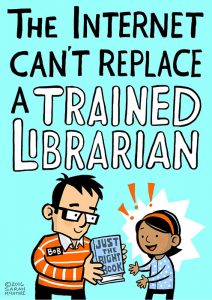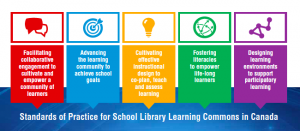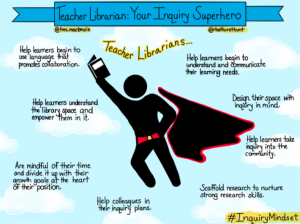My Learning Journey: Managing and Evaluating Reference Services (Thematic Blog Post #2)
Collaboration Is Key
Theme 2 was focused on further exploration of the various roles taken on by the Teacher-Librarian. I found this theme to be a reminder that the role of the Teacher-Librarian seems to be ever growing, much like the role of the classroom teacher. As a classroom teacher myself, I have previously overlooked the true ‘job description’ that the Teacher-Librarian takes on in the school and community. The discussions in this theme also reiterate that collaboration is the key to Teacher-Librarianship, such as collaboration with teachers, students, administration and the greater community.

https://jabberworks.livejournal.com/741817.html
In Riedling’s description of the “Reference Interview”, she outlines that Teacher-Librarians can strategically determine the student’s (or teacher’s) information needs. According to Riedling (2019), in order to effectively conduct reference services, the Teacher-Librarian should possess three things: knowledge of the collection, effective communication skills and competence efficiently and effectively in selecting, organizing and evaluating resources. She also states that although it is important for the student to find the information they were looking for, a true indicator of a successful “interview” is how the student perceives the interaction. The focus is more on the individual student and the individual Teacher-Librarian.
The Leading Learning framework (CLA) presents the Teacher-Librarian role as a collaborative role, where students work with one another and develop the skills needed to successfully find and learn new information. In fact, the first theme is “facilitating collaborative engagement to cultivate and empower a community of learners.” (p. 10). The focus becomes more on teachers, students, and Teacher-Librarians working together to learn rather than being led to the information.

Leading Learning (CLA)
Cooperative planning is an integral part of the Teacher-Librarian’s role because it provides additional opportunities for students to develop their information skills, as well as learning opportunities for the teachers and Teacher-Librarians. Some ways that Teacher-Librarians may promote cooperative planning within the school library learning commons:
- Promoting themselves as collaborative partners of the school community, including teachers. This
may not always be possible due to time constraints, but both the Teacher-Librarian and Classroom Teacher would play keys roles in the collaboration (TL as the information specialist and the CT as the subject expert).
- Pre-planning (or helping teacher pre-plan) the assignments and projects that are carried out by the students. This is an ideal suggestion but may not always be possible due to time constraints. However, the Teacher-Librarian may develop lessons around information skills and the use of reference materials.
Click the photo to for a larger view ->
Managing The Reference Collection
The responsibilities of the Teacher-Librarian (program and instruction, learning resource management and leadership in resource-based learning) outlined in this theme allowed me to reflect on my own school’s Teacher-Librarian and my practices as a classroom teacher in supporting their role as a collaborative Teacher-Librarian. I have always viewed Teacher-Librarians as the experts in the SLLC and upon reflection I see that they have the potential to be leaders and advocators for the school community, provided they have sufficient funding and allocation of time. This is why it is important for the Teacher-Librarian to share quality resources in a variety of formats and through a variety of methods in order to build student access. For example, our school’s Teacher-Librarian shows students and teachers how to access the ERAC BC Digital Classroom to view a variety of digital reference materials such as journals, magazines, encyclopedias, and almanacs.
Evaluating Reference Services
Riedling (2019) argues that in order to be able to provide quality resources for references services, Teacher-Librarians need competence in selecting, organizing and evaluating resources specific for their community’s learning needs.
Similarly, evaluating the reference services of the SLLC can be beneficial because it allows for a reflection and improvement for optimal student learning. The process for an evaluation is similar to that of evaluating an ordinary resource collection:
- Collecting data for a statistical evaluation of usage of the reference materials
- Evaluating the satisfaction level of clientele using the collection
- Comparing the findings to the standards. In this case, Achieving Information Literacy provides a guide for best practices.
- Self, peer, and administration evaluation.
Overall, this theme represents another yet realm of the multi-faceted ‘job description’ of the Teacher-Librarian. I learned practical strategies for improving collaboration, managing the reference collection, and evaluating the reference services. Most important, I was able to self-reflect on my own practices, which will help me become a better teacher and (future) Teacher-Librarian. I am once again humbled and reminded of the trueness of this infographic, which always seems to be popping up with each course in this diploma program and is still just fitting.

https://www.kqed.org/mindshift/53417/how-your-teacher-librarian-can-be-an-ally-when-teaching-with-inquiry
References
Canadian School Libraries, Leading learning: Standards of practice for school library learning commons in Canada, 2014, (pages 5-20.)
ERAC (Revised 2008). Evaluating, Selecting and Acquiring Learning Resources: A Guide. Retrieved from https://bcerac.ca/wp-content/uploads/2018/09/ERAC_WB.pdf
Riedling, A. M., & Houston, C. (2019). Reference skills for the school librarian: Tools and tips (4th ed.). Libraries Unlimited.
